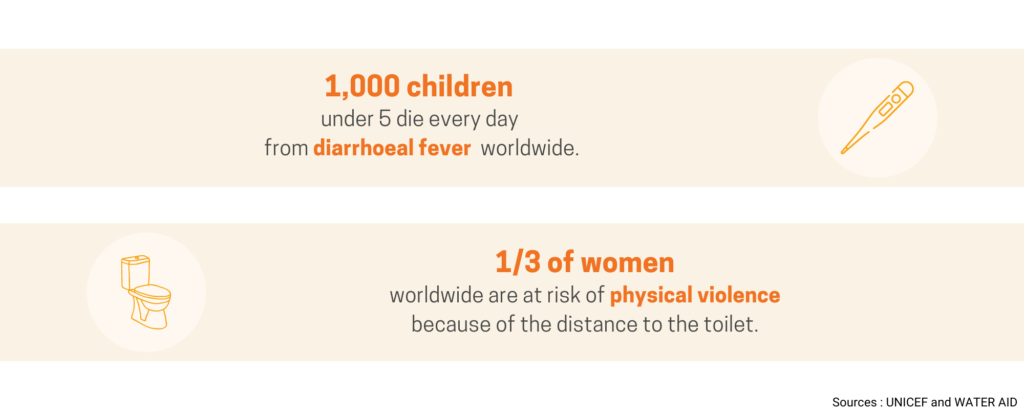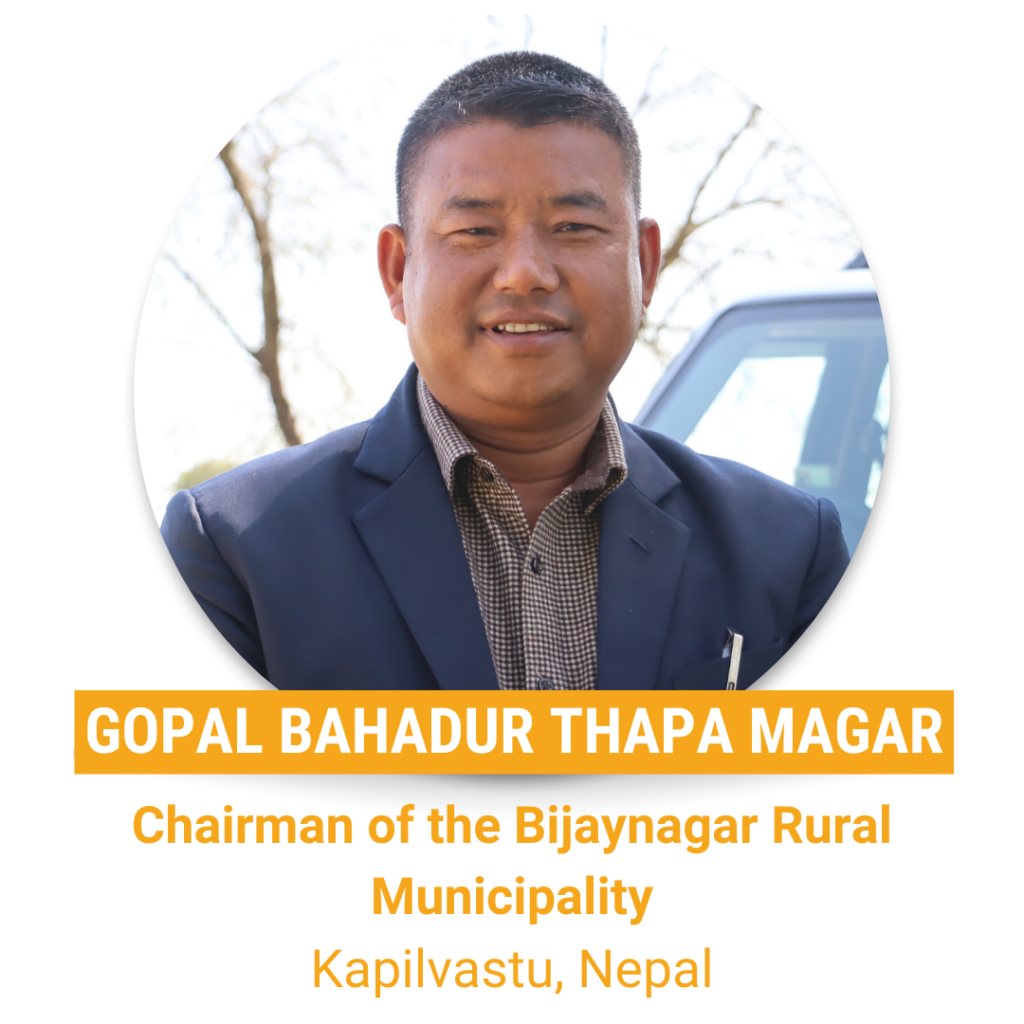Imagine a life where something as basic as a toilet is a luxury… For many families in rural villages in the Kapilvastu region of southwest Nepal, this is a daily reality. Polluting nature as a whole, promoting disease and increasing the risk of assault, the absence of toilets not only poses significant environmental, safety and health risks, but also deprives individuals of their dignity.
Greater impact on vulnerable populations
According to the World Health Organization, water, sanitation and hygiene problems, aggravated by open defecation, are indeed at the root of serious diarrhoeal diseases and contribute to malnutrition.
Despite the risk it represents, open defecation remains a widespread problem in Kapilvastu. It sustains a vicious circle of poverty for the most vulnerable populations, such as children, who are the most affected by symptoms of acute diarrhea and dehydration. This also has an impact on young girls and women who, unable to ensure proper menstrual hygiene, are likely to contract illnesses and infections. This sometimes forces them to interrupt their schooling. Similarly, the journey they often have to make makes them more prone to physical violence.

Sanitary facilities built through collaborative work
Kapilvastu is home to half the country’s population, and poverty is endemic despite its position as an active industrial and financial center. It is facing sanitation problems that the communities and Karuna are mobilizing against.
Although the local authorities have already taken the initiative of installing toilets, these do not contain septic tanks and are built without prior consultation of the community. A substantial budget of 50,000 NPR (357 euros) was allocated to the project, but the results were inconclusive due to a lack of community participation.
Integrating local communities into the entire process is crucial, and they are working with Karuna to build toilets. They also undertake awareness-raising campaigns on Water, Sanitation and Hygiene (WASH) issues.

One initiative that resonates deeply with me is the Toilet Construction activity. Karuna Shechen’s emphasis on empowerment and fostering a sense of ownership among individuals is truly commendable, ensuring that our progress is sustainable and impactful in the long run.
Looking ahead, I am enthusiastic about continuing our partnership with Karuna Shechen to bring about further positive changes in our community.
These toilets are built around Karuna’s new intervention model: Altruism in Action. The fundamental component is the Better Future Council, abbreviated BFC. It comprises two volunteer representatives, one male and one female, elected by their village. Different villages are grouped into clusters of around 5,000 people.
The representatives are accompanied by a pair of Karuna employees (one man, one woman) responsible for ensuring inclusiveness and good governance. They meet monthly with villagers to discuss and identify their specific needs.
Getting the community more involved is a way of encouraging responsibility, investment, empowerment and resilience.

The emphasis is on community integration and the use of regional resources, in particular to reduce costs and support local authorities. Similarly, locally available sand is used as cement.
The community is involved in the entire process: from planning to installation, it participates in 60% of the construction, compared with 40% for Karuna, which provides both technical and financial assistance of 10,000 NPR (71 euros).
Improved living conditions
While these toilets previously seemed inaccessible due to their cost, 80 toilets have already been installed thanks to this altruistic collaboration, which confirms that there’s strength in numbers. Many families have seen their hygiene conditions improve, and have become aware of the dangers of open defecation thanks to WASH awareness programs.
Building toilets is indeed an essential step, but it cannot be the complete solution. That’s why it’s coupled with awareness-raising. In this way, the community learns about good hygiene practices and the importance of sanitation. Through these preventive measures, the community becomes more involved, guaranteeing the long-term effectiveness of the project.

Witnessing many in our village embark on this journey, I too felt the urgency to act. However, the reality of my financial situation held me back. It was through the informative WASH triggering sessions that I fully grasped the health hazards of open defecation. Motivated by this newfound understanding, I sought support from Karuna Shechen to navigate the technical and financial aspects of toilet construction.
The WASH triggering sessions opened our eyes to the importance of proper sanitation and hygiene practices. We realized the true value of having a toilet in our homes. With the construction completed, I feel a profound sense of satisfaction and security, knowing that my family no longer has to endure the risks associated with venturing into unsafe areas for our basic needs.

Constructions that have given hope
This project has given as much joy as it has hope, thanks to the involvement of every single person involved. In the long term, the aim is to bring total sanitation to the villages of Bijaynagar and Yashodhara, and to bring about a lasting improvement in water, sanitation and hygiene practices.
Symbolizing pride and self-reliance, these facilities represent much more than just toilets: with each construction, we move closer to the vision of a world where every person has access to greater dignity and security.
Looking ahead, I am enthusiastic about continuing our partnership with Karuna Shechen to bring about further positive changes in our community. Whether it’s promoting cleaner, healthier environments or improving access to healthcare and education, I am fully committed to these endeavors.
Gopal Bahadur Thapa Magar



Sources :
- «WE CAN’T WAIT», A report on Sanitation and hygiene for women and girls, Water Aid, 2014 ;
- «Women and girls bear brunt of water and sanitation crisis», World Health Organization, 2023 ;
- «Sanitation», World Heath Organization, 2024.
